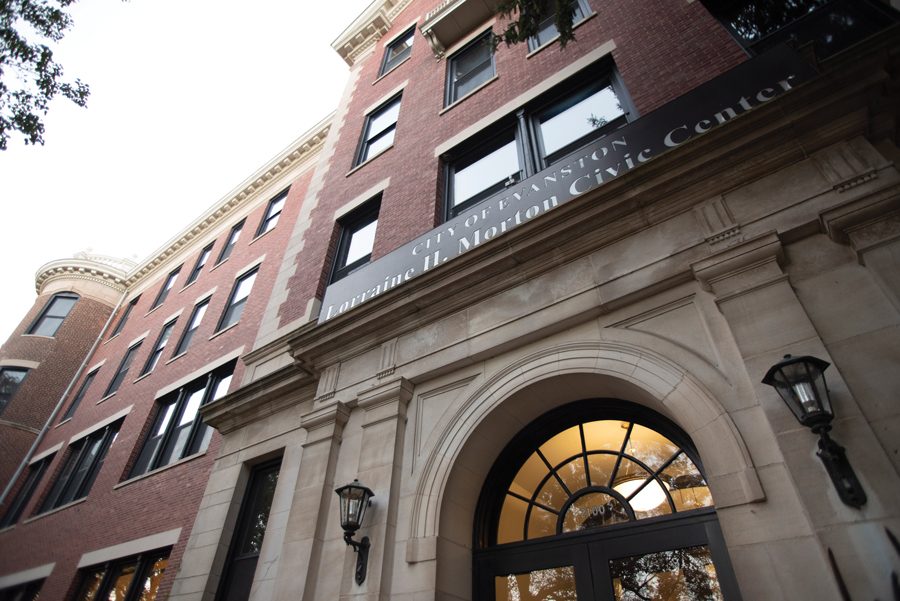Amid calls for housing relief, aldermen say city resources are limited
Daily file photo by Colin Boyle
The Lorraine H. Morton Civic Center. Aldermen said the city cannot offer a comprehensive plan for housing relief.
April 6, 2020
When the COVID-19 pandemic began disrupting incomes, Evanston residents turned to the city for support to keep up on rent and mortgage payments. However, aldermen are saying comprehensive relief to citizens is outside the means of the city.
Ald. Donald Wilson (4th) told the Daily the city did not have the legal authority nor the financial means to suspend or pay residents’ housing costs.
He was responding to a petition circulating online calling for the city to place a freeze on rents, mortgages and utility payments, which has garnered hundreds of signatures since it went live March 21. The petition’s authors also scripted a letter template they encouraged residents to send to their aldermen, of which Wilson received several.
City officials say they have no authority to order landlords or mortgage lenders to suspend collection, but the petition has continued to collect signatures — even after the authors said a rent freeze was outside the city’s means. The petition remains active as of Sunday. Local rent controls have been prohibited under Illinois law since 1997.
Wilson said much of the city’s revenue comes from many of the services and fees for which the city had suspended collection. City Council passed an ordinance March 17 delaying some payments to the city for 60 days, including water bills, parking tickets, vehicle compliance citations, liquor taxes and amusement taxes.
Other government entities and utility providers have offered temporary relief measures. The Cook County Sheriff’s Office announced March 14 that all court-ordered evictions would be suspended for the next 30 days. Nicor Gas and ComEd have halted service disconnections for non-payment through May 1, compliant with an order from the Illinois Commerce Commission that also suspends late payment fees until at least the same date.
Michele Hays, founder of Back On Their Feet, said the freeze on evictions had lowered the number of requests for rent assistance received by the community support group. However, she said, the temporary suspension could lead to a glut of evictions once the eviction suspension ends.
“We’re just kind of kicking that problem down the road,” Hays said.
Ald. Eleanor Revelle (7th) suggested a solution would be to forgive unpaid water bills even after the 60-day delay had passed.
Revelle said the City Council did not yet have a comprehensive plan for housing relief.
“We have more concerns than we can deal with at the moment,” Revelle said. “It’s going to boil down to resources.”
Multiple aldermen said citizens should look to the General Assistance Program and its subset, the Emergency Assistance Fund. The GA program offers job search and counseling services for unemployed residents, while the EAF focuses on helping residents cover rent, mortgage and utility payments.
The city had expedited enrollment for both the GA program and the EAF and relaxed enrollment standards for the GA program, according to Ald. Cicely Fleming (9th).
But the GA program was already projected to run a deficit in 2020, and pandemic pressures could cut further into the program’s reserves — currently around $70,000 — by the end of the year.
Ald. Robin Rue Simmons (5th) suggested that in the future, aldermen could consider redirecting funds from other programs to bolster the G.A.P. and other relief programs.
Mary Ellen Ball, CEO of fair housing not-for-profit Open Communities, said she had seen a “massive increase” in the number of residents seeking relief.
“People are terrified,” Ball said. “Right now people don’t know if they will have a job, if they will make rent, if they will make a mortgage payment.”
She said the best thing the city could do right now is to direct residents to community resources like Open Communities, which could respond faster than government bodies. However, Ball said, an effective response would ultimately require a “massive partnership” including not-for-profits and multiple levels of government.
The City of Evanston’s webpage about the General Assistance Program can be found here, including a form for applying for both the GA program or the EAF.
Open Communities can be reached at [email protected] or 847-501-5760.
Email: [email protected]
Twitter: @joshuajirvine
Correction: A previous version of this article misspelled Michele Hays name. The Daily regrets this error.












